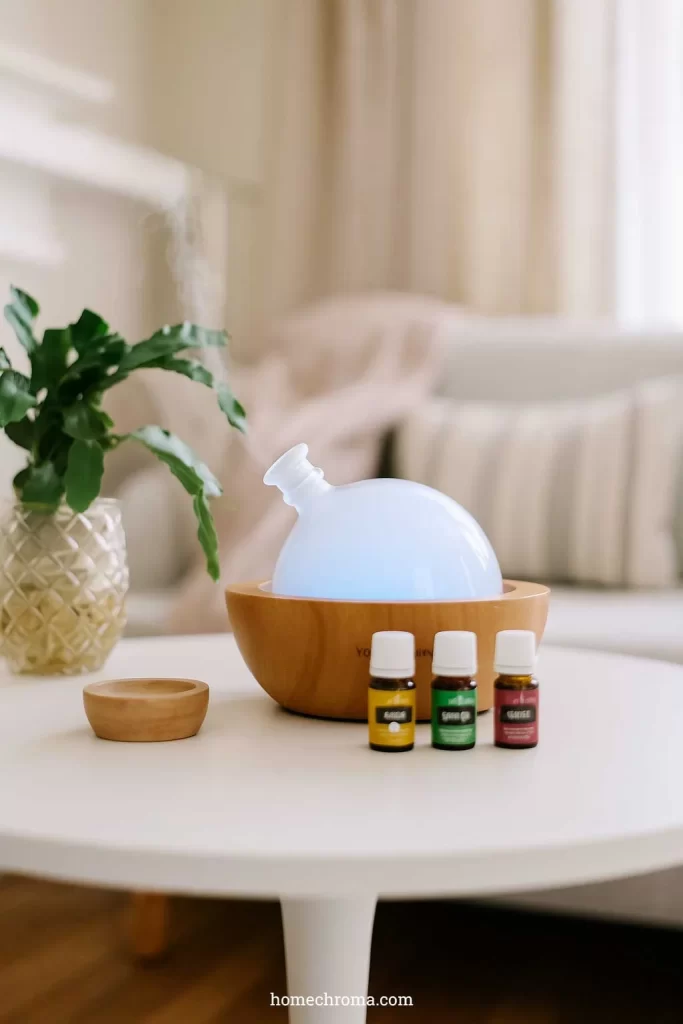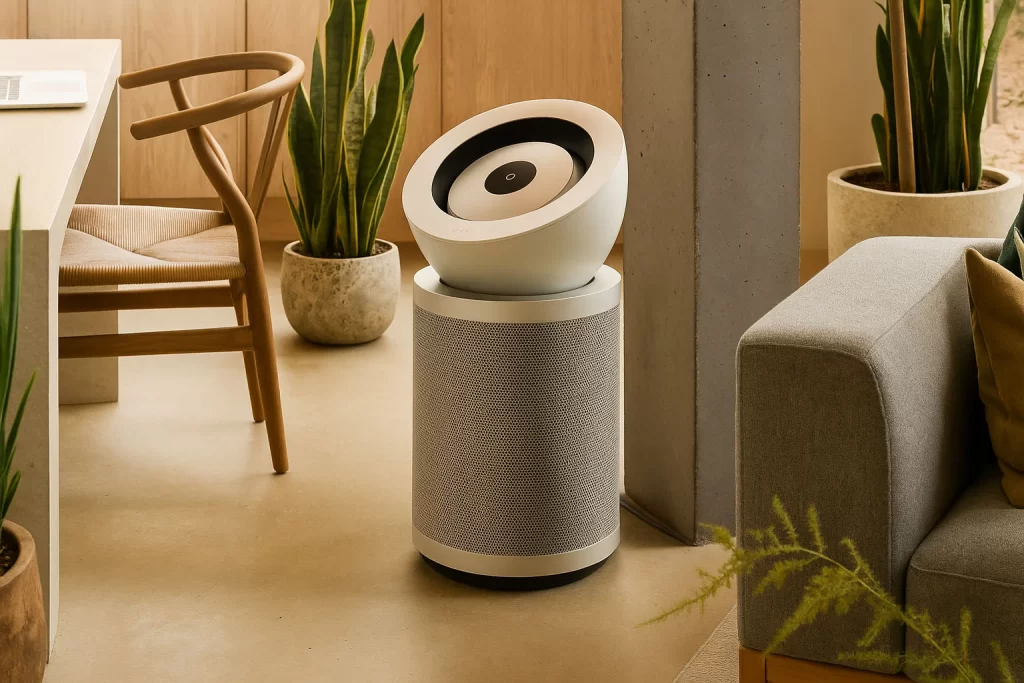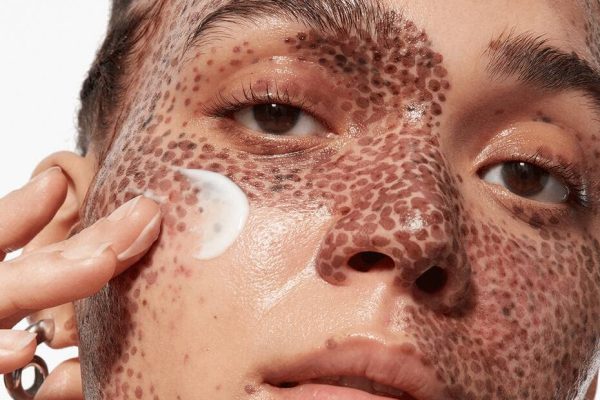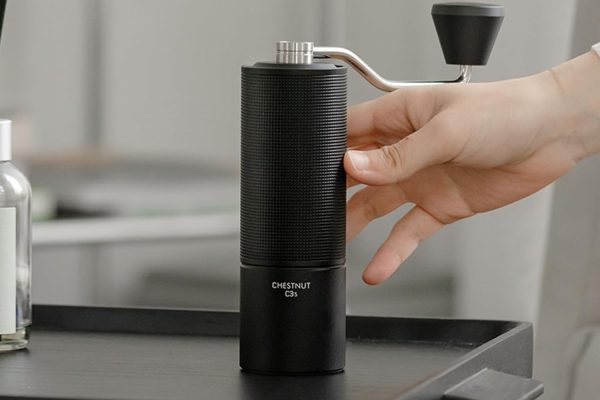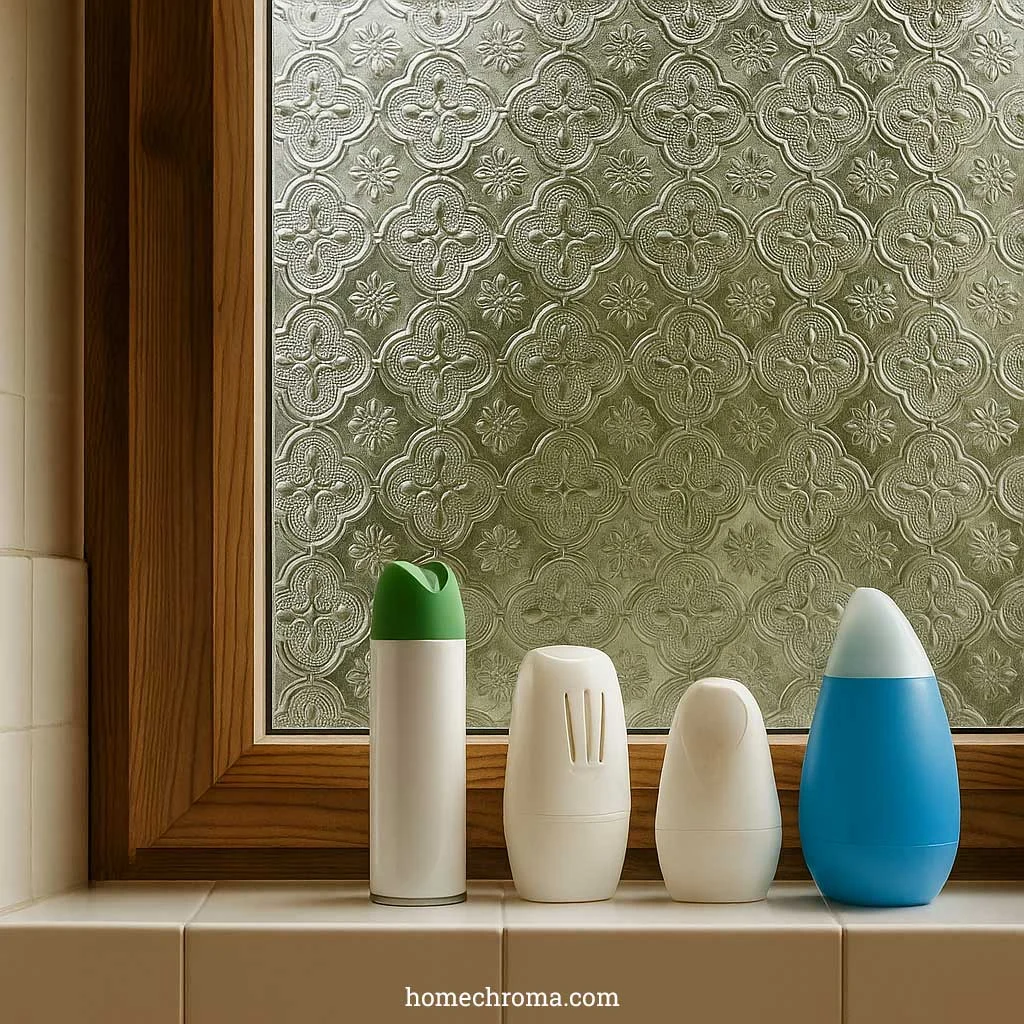 When you walk into your home and detect an unpleasant odor, what’s your first instinct? For millions of people, the answer is to reach for a synthetic air freshener. This seemingly harmless choice might actually be the number one mistake affecting your mental health at home.
When you walk into your home and detect an unpleasant odor, what’s your first instinct? For millions of people, the answer is to reach for a synthetic air freshener. This seemingly harmless choice might actually be the number one mistake affecting your mental health at home.
The Hidden Danger of Synthetic Air Fresheners
Synthetic air fresheners have become ubiquitous in modern homes. These products—including sprays, plug-ins, gels, and solid air fresheners—promise to create pleasant environments but harbor a complex mixture of chemicals that can negatively impact mental wellbeing, particularly for those struggling with depression.
The problem lies in their chemical composition. Most synthetic air fresheners contain:
- Volatile Organic Compounds (VOCs)
- Phthalates
- Formaldehyde
- Benzene
- Toluene
- Various undisclosed synthetic fragrances
 What makes this particularly troubling is the lack of transparency in product labeling. Manufacturers often use vague terms like “fragrance” to mask specific chemical compositions. Even products marketed as “green” or “natural” can still contain harmful VOCs.
What makes this particularly troubling is the lack of transparency in product labeling. Manufacturers often use vague terms like “fragrance” to mask specific chemical compositions. Even products marketed as “green” or “natural” can still contain harmful VOCs.
The Science Behind Synthetic Scents and Depression
VOCs: The Neurological Disruptors
VOCs are easily released into the air and have been linked to numerous neurological symptoms. Research connects VOC exposure to:
- Headaches and dizziness that can trigger or worsen depressive episodes
- Cognitive impairments affecting memory and focus
- Increased prevalence and risk of depression through inflammation
- Oxidative stress pathways within the brain that play a significant role in depressive disorders
When cognitive functions like memory and concentration are impaired, daily functioning suffers. This creates frustration and diminishes feelings of self-efficacy—common experiences for those battling depression.
Phthalates: Hormone Disruptors That Affect Mood
Phthalates, chemicals used to extend fragrance duration, are known endocrine disruptors that interfere with hormonal balance. Research has established:
- A positive association between phthalate exposure and elevated risk of depressive symptoms in adults
- Links to postpartum depression specifically
- Disruption of sex hormones like progesterone that play crucial roles in mood regulation
This hormonal interference can trigger or worsen depressive symptoms, creating a hidden pathway from your air freshener to your mental health.
Formaldehyde: More Than Just a Carcinogen
Formaldehyde appears in some air fresheners both as a direct ingredient and as a secondary pollutant formed through chemical reactions. Beyond its cancer risks, research has linked formaldehyde exposure to:
- Increased feelings of depression and anxiety
- Significant mood alterations
- Reduced levels of crucial neurotransmitters like norepinephrine
- Impact on glucocorticoid receptors in the hippocampus—a brain region vital for mood regulation
Population studies have found significant associations between formaldehyde concentrations in the body and elevated risk of depression in adults.
The Physical-Mental Health Connection
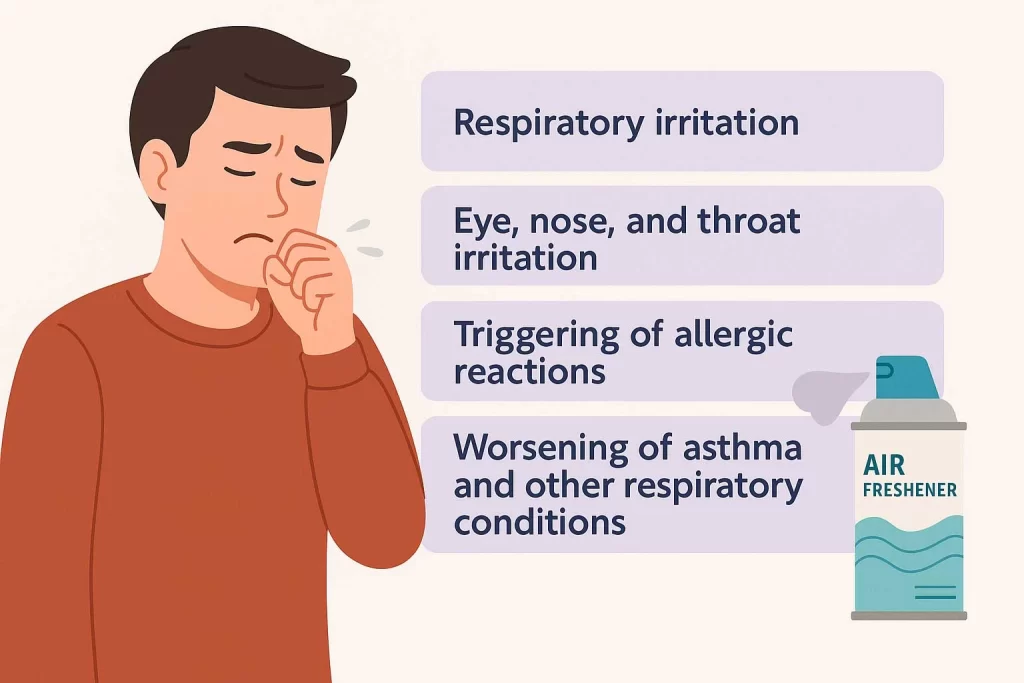 Beyond direct neurological impacts, synthetic fragrances cause physical discomfort that can worsen mental health:
Beyond direct neurological impacts, synthetic fragrances cause physical discomfort that can worsen mental health:
- Respiratory irritation
- Eye, nose, and throat irritation
- Triggering of allergic reactions
- Worsening of asthma and other respiratory conditions
This chronic physical discomfort creates a negative cycle that can exacerbate depression. Individuals with pre-existing sensitivities may be particularly vulnerable to these effects.
Why We Keep Making This Mistake
Despite these risks, synthetic air fresheners remain popular for several reasons:
- They offer immediate gratification by quickly masking unpleasant odors
- They’re marketed as essential for creating pleasant living spaces
- There’s limited public awareness about their potential health impacts
- Ingredient labeling remains vague and inadequate
- Consumers prioritize quick fixes over addressing odor sources
A study in Australia revealed that over 70% of the population was unaware that fragranced products emit hazardous air pollutants. This knowledge gap, combined with misleading marketing that sometimes promotes therapeutic benefits for synthetic fragrance oils, leads consumers to believe these products are beneficial or at least harmless.
Natural Alternatives That Support Mental Health
In contrast to synthetic options, natural home scent choices offer potential benefits for mental health.
The Science of Aromatherapy
Young Living Essential Oils Aria Ultrasonic Diffuser [click to view…]
Aromatherapy using natural essential oils works through different mechanisms:
- Scent molecules from essential oils travel directly to the brain’s emotional center (the limbic system) via olfactory nerves
- Essential oils can influence the release of mood-regulating neurotransmitters like serotonin and dopamine
- Natural scents can trigger positive memories that improve mood states
While aromatherapy should complement rather than replace medical treatments for depression, research suggests it can be a valuable supportive approach.
The Memory-Mood Connection
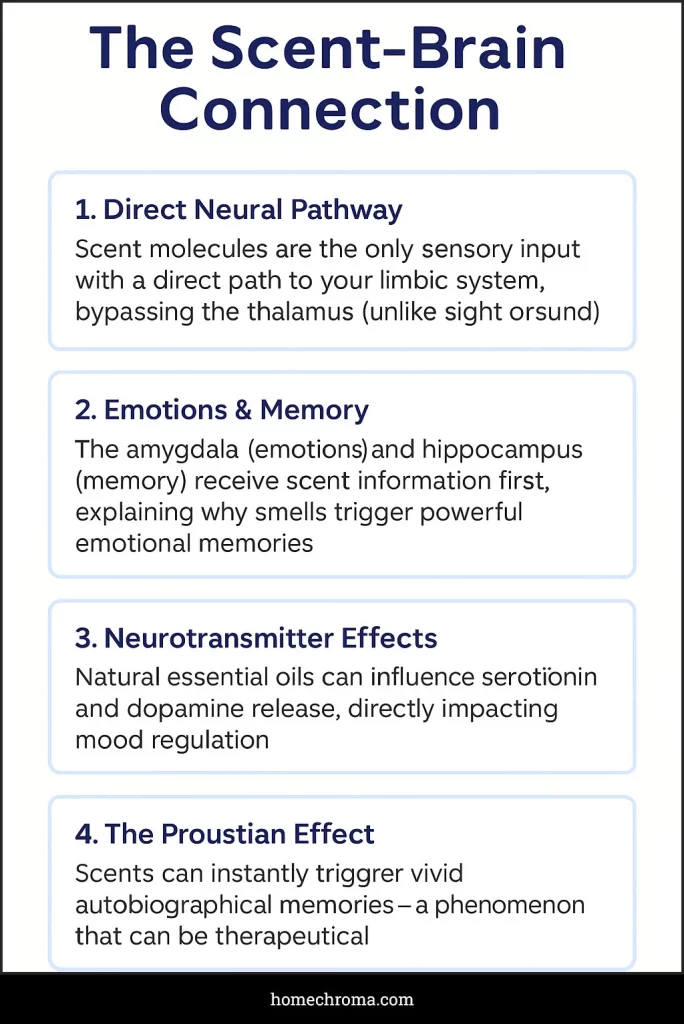 Scents possess a unique ability to evoke emotional memories—a phenomenon called the Proustian effect. This occurs because:
Scents possess a unique ability to evoke emotional memories—a phenomenon called the Proustian effect. This occurs because:
- The olfactory system connects directly to the amygdala and hippocampus—brain regions crucial for emotion and memory
- Recalling positive autobiographical memories improves mood and has therapeutic value
- Memory recall is stronger in depressed individuals when triggered by odor cues compared to word cues
This connection explains why familiar natural scents can be particularly powerful in triggering positive memories and potentially improving mood for those experiencing depression.
Creating a Scent-Safe Home for Better Mental Health
Eliminating Synthetic Fragrances
The first step is identifying and removing all synthetic air fresheners from your home:
- Check labels carefully, watching for vague terms like “fragrance”
- Remove all types: sprays, plug-ins, gels, and solids
- Be wary of products claiming to be “natural” without transparent ingredient lists
Introducing Natural Alternatives
 Natural Beeswax Pillar Candles [click to view…]
Natural Beeswax Pillar Candles [click to view…]
Explore these healthier options for creating pleasant home scents:
- Use ultrasonic essential oil diffusers with pure essential oils (lavender, citrus, bergamot)
- Choose natural candles made from beeswax, soy, or sustainable palm wax
- Add air-purifying fragrant plants like lavender, citrus plants, and mint
- Try DIY solutions like simmering spices or herbs
- Use natural odor absorbers like activated charcoal bags or baking soda
Improving Overall Air Quality
Dyson HEPA Big+Quiet Formaldehyde BP06 [click to view…]
Beyond scent choices, focus on creating a healthy air environment:
- Open windows regularly to allow fresh air circulation
- Address odor sources directly rather than masking them
- Use air purifiers with HEPA filters
- Maintain proper cleaning practices to prevent odor buildup
The Bigger Picture: Environmental Awareness and Mental Health
This issue highlights the intersection between our environment and mental health. The chemicals we introduce into our homes through seemingly innocent products can have profound effects on our psychological wellbeing.
By making conscious choices about home scents, we’re not just addressing depression risk factors—we’re taking control of our environmental health. This awareness represents a shift toward understanding how everyday decisions impact both physical and mental health.
Conclusion: A Simple Change With Significant Impact
The number one mistake in home scent choices that can worsen depression is the use of synthetic air fresheners containing VOCs, phthalates, and formaldehyde. These chemicals impact neurological function, disrupt hormones, and create physical symptoms that can trigger or exacerbate depressive states.
By eliminating synthetic fragrances and embracing natural alternatives, you create a home environment that supports rather than undermines mental wellbeing. This simple change represents a meaningful step toward a healthier relationship with your living space and your mind.
Remember that while scent choices matter, they should complement professional care for depression. Creating a scent-safe home is one important piece of a comprehensive approach to mental health that includes appropriate medical care, lifestyle factors, and environmental considerations.
Dora Decora is a biophilic interior design specialist and passionate blogger. With a deep commitment to integrating nature into living spaces, Dora specializes in creating environments that foster human-nature connections through thoughtful design elements. Her approach emphasizes sustainable materials, natural lighting, and organic patterns that enhance wellbeing and reduce environmental impact.
This post (https://homechroma.com/mistake-in-home-scent-choices-worsens-depression) was originally published by Dora Decora on Home Chroma. As an Amazon Associates partner, we are compensated for all qualifying purchases.
